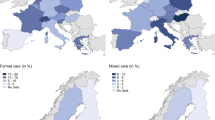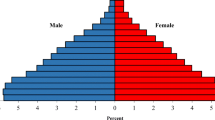Summary
Cross sectional studies were conducted in five towns in Japan before and after the introduction of the Long-term Care Insurance System (LTCIS), in order to evaluate the factors relating to depression among family caregivers for the frail elderly.
Depressive caregivers were more likely to consult with their doctors, to be in poor health, to care for demented elderly with behavioral disturbances than the non-depressive caregivers both before and after the LTCIS. Before LTCIS, depressive caregivers were more likely to attend to the elderly for more than 16 hours per day than their counterparts. After the LTCIS, depressive caregivers were more likely to be a spouse, to care for a frail elderly male, and less likely to be able to go out without accompanying the elderly than their counterparts.
Even after the introduction of LTCIS, half of the caregivers were depressive. It is suggested that a government agency should be created to support not only the frail elderly but also their caregivers.
Zusammenfassung
In fünf japanischen Städten wurden „cross-sectional“ Studien durchgeführt, um die Faktoren betreffend Depressionen der Angehörigen von zu Hause gepflegten älteren Patienten vor und nach der Einführung des Langzeit-Pflegeversicherungssystems (the long term care insurance system; LTCIS) zu untersuchen. Depressive Familienangehörige konsultierten häufiger ihren Arzt, waren häufiger in schlechtem Gesundheitszustand und pflegten häufiger Pflegebedürftige mit Verhaltensstörungen als nicht-depressive Angehörige, dies sowohl vor als auch nach der Einführung des LTCIS. Vor der Einführung des LTCIS pflegten depressive Angehörige häufiger als ihre nicht-depressiven Konterparts ihre Patienten mehr als 16 Stunden täglich. Nach der Einführung des LTCIS gab es – vergleichen mit nicht-depressiven – mehr weibliche depressive Angehörige, mehr pflegebedürftige Männer, aber weniger, die das Haus alleine verlassen konnten, ohne von ihren pflegebedürftigen Partnern begleitet zu werden.
Auch nach der Einführung des LTCIS waren mehr als die Hälfte der Angehörigen depressiv. Es wird die Einrichtung einer staatlichen Institution zur Unterstützung nicht nur Pflegebedürftiger, sondern auch deren Angehörigen empfohlen.
Similar content being viewed by others
References
and Welfare (2004) Life tables. Statistics and Information Department, Minister's Secretariat. Annual Statistical Report of National Health Condition and Health Promotion 51, Tokyo, pp 66–69 (in Japanese)
Campbell JC (1992) How policies change: the Japanese Government and the Aging Society. Princeton University Press, New Jersey
Arai Y (2001) Japan's new long-term care insurance. Lancet 357:171
Watts J (1998) Caring for Japan's elderly; mission impossible? Lancet 352:798
Maeda D (2003) The outline of new public long-term care insurance program. Japan Aging Research Center, Aging in Japan 2003. Japan Aging Research Center, Tokyo, pp 188–191
Kono S (2003) Demographic aspects of population aging in Japan. Japan Aging Research Center, Aging in Japan 2003. Japan Aging Research Center, Tokyo, pp 7–51
Barnes CL, Given BA, Given, CW (1992) Caregivers of elderly relatives; Spouses and adult children. Health Soc Work 17:282–289
Arai Y, Sugiura M, Washio M, Miura H, Kudo K (2001) Caregiver depression predicts early discontinuation of care for disabled elderly at home. Psychiatry Clin Neurosci 55:379–382
Campen C, Gameren E (2005) Eligibility for long-term care in the Netherlands: development of a decision support system. Health Soc Care Community 13:287–296
Tesch-Romer C (2001) Intergenerational solidarity and caregiving. Z Gerontol Geriatr 34:28–33
Shimizu Y (2003) Development of public long term care insurance and future direction of the elderly care. Japan Aging Research Center, Aging in Japan 2003. Japan Aging Research Center, Tokyo, pp 197–204
Washio M (1999) Family caregiving and cash payment for family caregiving. Jap Med J 3942:79–80 (in Japanese)
Washio M, Arai Y (1998) The expected role for care managers under the public long term care insurance for the elderly. Jap Med J 3891:73–76(in Japanese)
Scottish office social work services group (1991) Care management and assessment, practitioner's guide. HMSO Publication Centre, London
Oura A, Washio M, Izumi H, Mori M (2005) Burden among caregivers of the frail elderly and its correlation with the introduction of a long-term care insurance system for the elderly in fourth year. Jpn J Geriat 42:411–416 (in Japanese)
Radloff LS (1977) The CES-D scale, a self-report depression scale for research in the general population. Appl Psychol Meas 1:385–401
Arai Y, Kudo K, Hosokawa T, Washio M, Miura M, Hisamichi S (1997) Reliability and validity of the Japanese version of the Zarit caregiver burden interview. Psychiatry Clin Neurosci 51:281–287
Washio M, Arai Y (2001) The new public long-term care insurance system and feeling of burden among caregivers of the frail elderly in rural Japan. Fukuoka Igaku Zasshi 92:292–298
Washio M, Inoue N, Arai Y, Tokunaga S, Mori M (2002) Depression among caregivers of patients with Parkinson Disease. Int Med J 9:265–269
Washio M, Oura A, Arai Y, Mori M (2003) Depression among caregivers of the frail elderly: three years after the introduction of public Long-Term Care insurance for elderly. Int Med J 10:179–183
Arai Y, Kumamoto K, Washio M, Ueda T, Miura H, Kudo K (2004) Factors related to feelings of burden among caregivers looking after impaired elderly in Japan under the Long Term Care insurance system. Psychiatry and Clin Neurosci 58:396–402
Mahoney FI, Barthel DW (1965) Functional evaluation; the Barthel index. Maryland State Med J 14:61–65
Baumgarten M, Becker R, Gauthier S (1990) Validity and reliability of the dementia behavioral disturbance scale. J Am Geriatr Soc 38:221–226
Kroenke CH, Bennett GG, Fuchs C, Giovannucci E, Kawachi I, Schernhammer E, Holmes MD, Kubzansky LD (2005) Depressive symptoms and prospective incidence of colorectal cancer in women. Am J Epidemiol 162:839–848
Okamura F, Tashiro A, Utumi A, Imai T, Suchi T, Tamura D, Sato Y, Suzuki S, Hongo M (2000) Insulin resistance in patients with depression and its changes during the clinical course of depression: minimal model analysis. Metabolism 49:1255–1260
Waite A, Bebbington P, Skelton-Robinson M, Orrell M (2004) Life events, depression and social support in dementia. Br J Clin Psychol 43:313–324
Takahashi M, Tanaka K, Miyaoka H (2005) Depression and associated factors of informal caregivers versus professional caregivers of dementia patients. Psychiatry Clin Neurosci 59:473–480
Washio M, Arai Y (1999) Depression among caregivers of the disabled elderly in southern Japan. Psychiatry Clin Neurosci 53:407–412
Arai Y, Washio M, Kudo K (2000) Factors associated with admission to a geriatric hospital in semisuburban southern Japan. Psychiatry Clin Neurosci 54:213–216
Rose-Rego SK, Strauss ME, Smyth KA (1998) Differences in the in the perceived well-being of wives and husbands caring for persons with Alzheimer's disease. The Gerontologist 38:224–230
Pruchno RA, Resch NL (1989) Husbands and wives as caregivers: antecedents of depression and burden. The Gerontologist 29:159–165
Lutzsky SM, Knight BG (1994) Explaning gender differences in caregiver distress: The role of emotional attentiveness and coping style. Psychology and Aging 12:277–287
Oura A, Washio M, Wada J, Arai Y, Mori M (2006) Factors related to institutionalization among the frail elderly with home-visiting nursing service in Japan. Gerontology 52:66–68
Author information
Authors and Affiliations
Corresponding author
Rights and permissions
About this article
Cite this article
Oura, A., Washio, M., Arai, Y. et al. Depression among caregivers of the frail elderly in Japan before and after the introduction of the Public Long-Term Care Insurance System. Z Gerontol Geriatr 40, 112–118 (2007). https://doi.org/10.1007/s00391-007-0412-z
Received:
Accepted:
Issue Date:
DOI: https://doi.org/10.1007/s00391-007-0412-z




